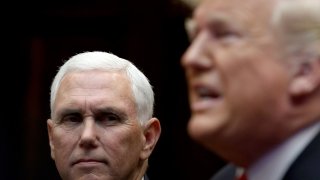
Former Vice President Mike Pence is planning to fight a subpoena by the special counsel overseeing investigations into efforts by former President Donald Trump and his allies to overturn the results of the 2020 election, according to people familiar with his thinking.
Pence and his attorneys are planning to cite constitutional grounds as they prepare to resist special counsel Jack Smith's efforts to compel his testimony before a grand jury. They argue that because Pence was serving in his role as president of the Senate on Jan. 6, 2021 as he presided over a joint session of Congress to certify the election results, he is protected from being forced to address his actions under the Constitution's “speech-or-debate” clause that shields members of Congress.
“I think he views it as essential protection of his Constitutional role," said Marc Short, a close adviser to Pence who served as his White House chief of staff.
Short compared Pence’s position to the one he took on Jan. 6 when he refused to go along with Trump’s unconstitutional scheme to try to overturn the results of the 2020 election, as well as Pence's rejection of using the 25th Amendment to remove Trump from office in the aftermath.
Get Tri-state area news delivered to your inbox.> Sign up for NBC New York's News Headlines newsletter.
“The vice president of the United State is the president of the Senate and the fact is the functions of Jan. 6 were specific to that role," he said of Pence, who has been laying the groundwork for a likely presidential campaign that would put him in direct competition against his former boss.
Whether Pence's arguments will succeed in limiting or altogether avoiding grand jury testimony is unclear, but the Justice Department is expected to oppose those efforts and to make the case that the former vice president's cooperation is essential for a probe focused on Trump's actions.
U.S. & World
The decision to try to fight the subpoena, which was first reported by Politico, marks a change in posture from Pence, who has cooperated with the Justice Department as it investigates how documents with classified markings ended up at his Indiana home after the end of the Trump administration. He permitted the FBI to search the property last week.
Even if his objection is ultimately rebuffed from the courts, an antagonistic posture could allow Pence to argue that he tried to fight the Justice Department — a potentially useful position in a GOP primary, as many in the Republican base have grown distrustful of federal law enforcement, in part due to Trump's drumbeat of criticism. And it could delay the special counsel probe, which Smith is working to rapidly advance.
Pence has spoken extensively about Trump’s pressure campaign urging him to reject President Joe Biden's victory in the days leading up to Jan. 6, including in his book, “So Help Me God.” Pence, as vice president, had a ceremonial role overseeing the counting of the Electoral College vote, but did not have the power to impact the results.
Pence's decision to resist the subpoena also came after extensive back-and-forth between his lawyers and the special counsel's office, according to a person familiar with the discussions who spoke on condition of anonymity to discuss the closed-door negotiations.
The Justice Department declined to comment Tuesday on Pence's plans.
Pence is expected to address the issue in more detail during a visit to Iowa Wednesday as he inches closer to a likely presidential run.
Richard Levy, a constitutional law professor at the University of Kansas, said it is true that the vice president is in a unique position as the technical presiding officer of the Senate, making the officeholder in some respects a member of the chamber.
But he said that not everything a member does is protected by the speech-or-debate clause and it is debatable whether the vice president’s role in certifying the election, which involves a mix of constitutional and senatorial functions, would be protected.
In any event, Pence’s argument would likely serve to limit the scope of his testimony rather than to block it altogether, he said.
“I don’t think the speech or debate clause would be a basis for quashing the subpoena altogether. It would be a basis for objecting to particular questions,” he said.
The subpoena has been an aggressive step from Smith as he continues to investigate efforts by Trump and his allies to remain in power, including the storming of the Capitol building on Jan. 6.
Trump supporters, driven by the lie that the election was stolen, brutally pushed past the police and smashed through the windows and doors while Pence was presiding over the certification of Biden’s victory. The vice president was steered to safety with his staff and family as some in the mob chanted, “Hang Mike Pence!”
While the mob was in the Capitol, Trump tweeted, “Mike Pence didn’t have the courage to do what should have been done to protect our Country and our Constitution.”
A House committee investigating the Jan. 6 attack recommended that the Justice Department bring criminal charges against Trump and others over his efforts to overturn his 2020 election loss.



